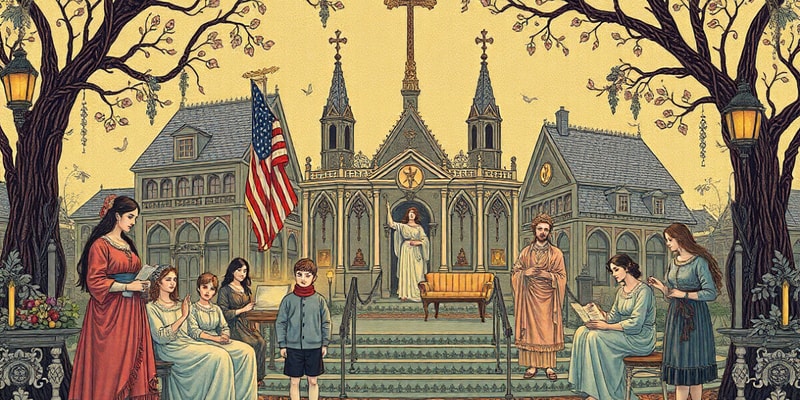Podcast
Questions and Answers
How did Tocqueville view democracy beyond political institutions?
How did Tocqueville view democracy beyond political institutions?
What was a significant trend in religion during the nineteenth century according to Tocqueville?
What was a significant trend in religion during the nineteenth century according to Tocqueville?
Which beliefs did the emerging rational religious movements emphasize?
Which beliefs did the emerging rational religious movements emphasize?
What did Tocqueville suggest about the relationship between democracy and culture?
What did Tocqueville suggest about the relationship between democracy and culture?
Signup and view all the answers
What did significant segments of the established churches begin to reject?
What did significant segments of the established churches begin to reject?
Signup and view all the answers
Study Notes
The Culture of Democracy
- Tocqueville believed a democratic regime would influence every aspect of life, including culture, morals, and spirituality.
- The partnership between Protestantism and Enlightenment rationalism was starting to weaken, with individuals gravitating towards more rational and progressive forms of Christianity like Deism and Unitarianism.
- Deism and Unitarianism emphasized reason, God's unity, the inherent goodness of humanity, and the capacity for self-improvement through reason and education.
- The emergence of new religious communities like Mormons, Rappites, Shakers, and Oneida Community reflected the social changes and individualistic tendencies prevalent in the early 19th century.
- The religious communities often emphasized communal living, reforms, and societal transformation through personal actions.
- Harriet Beecher Stowe's "Uncle Tom's Cabin" played a significant role in shaping public opinion on slavery, influencing the abolitionist movement.
- The novel's emotional impact and depiction of slavery's brutality on both enslaved and slaveholders exposed the institution's moral flaws.
- Several Americans questioned if the United States could develop a unique cultural identity separate from its colonial influences, particularly in the sphere of high culture, including literature, arts, and drama.
- Tocqueville observed a lack of original cultural expressions in America, predicting that democracy would lead to mediocre, commercially driven literature.
- Walt Whitman emerged as a prominent literary figure, representing the spirit of Jacksonian America and celebrating the inherent democratic values, as opposed to the elite, more European-inspired sensibilities.
- Whitman's work, like "Leaves of Grass", embraced all aspects of reality, from the everyday experiences of working-class individuals to the more refined elements of society.
- Whitman's poetry deviated from traditional forms and employed vernacular language, challenging artistic norms.
- Despite some initial resistance, Whitman's contributions are recognized as expressions of the emerging democratic culture.
- D.H. Lawrence, a British writer and critic, viewed Whitman's literary work as a reflection of the open road, symbolizing freedom and self-discovery.
Studying That Suits You
Use AI to generate personalized quizzes and flashcards to suit your learning preferences.




